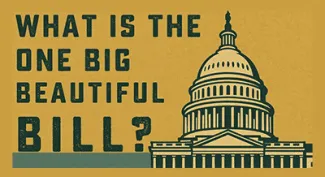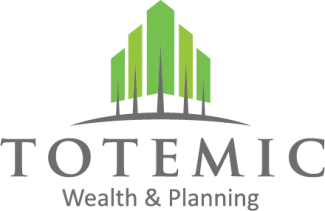
Understanding the One Big Beautiful Bill (OBBB): What It Means for You
On July 4, 2025, President Trump signed the One Big Beautiful Bill Act (OBBB) into law, marking a significant shift in U.S. fiscal policy. This comprehensive legislation introduces sweeping changes to tax structures, social programs, and federal spending. At Totemic Wealth & Planning, we're committed to helping you navigate these changes and understand their potential impact on your financial future.(aaoms.org)
🧾 Key Tax Changes
The OBBB introduces several tax-related provisions that may affect individuals and businesses:
- Permanent Extension of 2017 Tax Cuts: The individual tax cuts from the 2017 Tax Cuts and Jobs Act are now permanent, maintaining lower tax rates and reformed brackets.
- Increased Standard Deduction: The standard deduction has been permanently increased to $15,750 for single filers and $31,500 for joint filers, with inflation indexing after 2025.(Investopedia)
- Temporary Deductions (Expiring 2028):
- Tipped Income: Deduction for tipped income up to $25,000 for workers earning under $150,000 (single) or $300,000 (joint).
- Overtime Pay: Deduction for overtime pay up to $12,500 (single) or $25,000 (joint) for workers earning under $150,000 (single) or $300,000 (joint).
- Auto Loan Interest: Deduction up to $10,000 per year for interest on auto loans for U.S.-assembled cars purchased between 2025-2028, phasing out for higher earners.
- Senior Deduction (Expiring 2028): An additional tax deduction of up to $6,000 for seniors aged 65 and older, phasing out at incomes of $75,000 (single) or $150,000 (joint).
- Child Tax Credit: The maximum Child Tax Credit increases from $2,000 to $2,200 per child, with inflation indexing.
- SALT Cap Adjustment (Expiring 2029): The State and Local Tax (SALT) deduction cap increases from $10,000 to $40,000 for taxpayers with modified adjusted gross income (MAGI) under $500,000. This provision reverts to a $10,000 cap after 2029.
- Business Tax Relief: Enhancements include immediate expensing of domestic R&D costs, reinstatement of 100% first-year bonus depreciation, increased Section 179 deduction cap to $2.5 million, and a permanent 20% Qualified Business Income (QBI) deduction, expanded to 23%.
- International Tax Adjustments: Modifications to Foreign Tax Credits, Global Intangible Low-Tax Income, and other provisions aim to make international taxation more favorable for U.S. companies.
- Trump Accounts: Introduction of tax-advantaged accounts for children born between 2025 and 2028, with a $1,000 government deposit at birth and annual contributions up to $5,000, growing tax-deferred for education, job training, or home purchase.
🏥 Changes to Social Programs
The OBBB also brings significant changes to social welfare programs:(Kiplinger)
- Medicaid:
- Introduction of work requirements for recipients aged 19 to 64, mandating at least 80 hours of work per month.
- Reduction in federal spending on Medicaid, with estimates of nearly $930 billion in cuts.
- Implementation of co-pays up to $35 for certain services for enrollees with incomes between 100% and 138% of the federal poverty level.(Investors.com)
- Supplemental Nutrition Assistance Program (SNAP):
- Expansion of work requirements for recipients.
- States made responsible for a portion of program costs.
- Healthcare Providers:
- Establishment of a $50 billion Rural Hospital Fund to support healthcare providers in rural areas, aiming to offset the impact of Medicaid cuts.
⚖️ Fiscal Impact
The Congressional Budget Office (CBO) estimates that the OBBB will increase the federal deficit by approximately $3.4 trillion over the next decade, due to $4.5 trillion in tax cuts and $1.1 trillion in spending cuts. (Investors.com)
📊 Summary of Key Changes
Category | Provision | Duration |
|---|---|---|
Tax Cuts | Permanent extension of 2017 individual tax cuts | Permanent |
Standard Deduction | Increase to $15,750 (single) / $31,500 (joint), indexed for inflation after 2025 | Permanent |
Tipped Income Deduction | Up to $25,000 for eligible workers | 2025–2028 |
Overtime Pay Deduction | Up to $12,500 (single) / $25,000 (joint) for eligible workers | 2025–2028 |
Auto Loan Interest | Deduction up to $10,000 for U.S.-assembled cars | 2025–2028 |
Senior Deduction | Additional $6,000 deduction for seniors aged 65 and older | 2025–2028 |
Child Tax Credit | Increase from $2,000 to $2,200 per child, indexed for inflation | Permanent |
SALT Deduction Cap | Increase from $10,000 to $40,000 for MAGI under $500,000 | 2025–2029 |
Business Tax Relief | Enhanced deductions and expensing provisions | Permanent |
Trump Accounts | Tax-advantaged accounts for children born 2025–2028 | Ongoing |
Medicaid Changes | Work requirements and spending cuts | Ongoing |
SNAP Changes | Expanded work requirements and state cost-sharing | Ongoing |
Rural Hospital Fund | $50 billion fund to support rural healthcare providers | Ongoing |
📌 What This Means for You
The OBBB introduces a complex array of changes that may affect your financial planning, tax obligations, and access to social programs. It's crucial to assess how these provisions align with your personal circumstances and long-term goals.
📞 Let's Talk
At Totemic Wealth & Planning, we're here to help you navigate these changes and adjust your financial strategies accordingly. Contact us today to schedule a consultation and ensure you're prepared for the road ahead.
Sources:
- Congressional Budget Office. "Estimated Budgetary Effects of H.R. 1, the One Big Beautiful Bill Act."
- Investors.com. "Big Beautiful Bill Clears Congress; Here's What It Does."
- Business Insider. "The Big Beautiful Bill may have just quietly boosted Big Tech earnings."
- Congress.gov. "H.R.1 - One Big Beautiful Bill Act." (Investors.com, Business Insider, Congress.gov)

